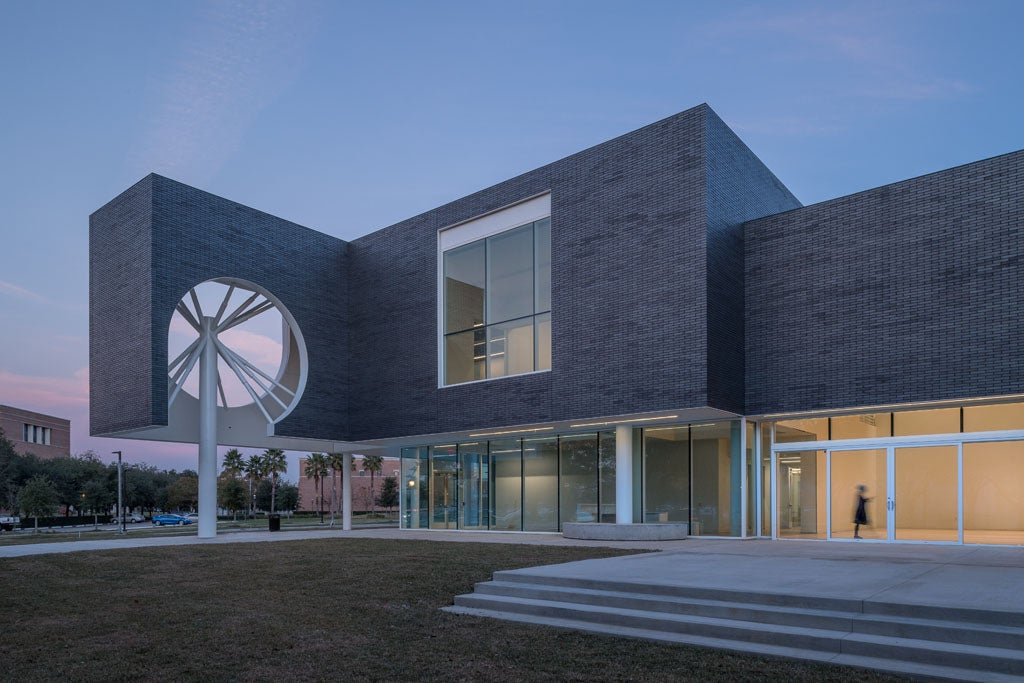We must aggressively foster collaborative relationships with other institutions to leverage our resources.
We continue to leverage our strong relationships with our fellow institutions in the Texas Medical Center (TMC), as well as with Houston museums, NASA, the education and energy sectors, and other local organizations. Numerous Rice faculty members have benefited from collaborative research grants, and several have joint appointments at Rice and TMC institutions. Students in the art history Ph.D. program, which launched during the V2C, are studying the collections of Houston museums, while other humanities students are leveraging museums to explore cultural heritages. Collaborations with renowned local and national artists will be further enhanced by the opening of the new Moody Center for the Arts. The Rice Space Institute continues to play a part in the evolving space industry. OpenStax partners with educational resource companies and universities around the nation to improve student access to education through free, openly licensed textbooks and adaptive learning platforms. Research partnerships with other universities, such as the Nanotechnology-Enabled Water Treatment Center and Subsea Systems Institute, are advancing Rice’s impact on energy.
Moody Center for the Arts enhances collaboration within and beyond campus

Examples of V2C Progress:
Texas Medical Center — Rice’s relationships with the TMC continue to enhance research in science and engineering, as well as economics, religion, psychology, data science and business. Undertakings include joint degree programs, collaborative research, teaching and outreach projects. The Health-Related Research and Educational Initiatives, established in 2016, is designed to strengthen research and collaboration between Rice and other members of the TMC. Additionally, the Baylor College of Medicine/Rice oversight council works to establish inter-institutional agreements. The Health Care @ Rice University MBA program prepares students for the health care sector. The Center for Health and Biosciences at the Baker Institute for Public Policy conducts policy research in the areas of health care delivery and medical research. Students in the Oshman Engineering Design Kitchen partner with doctors and patients to engineer solutions to meet patient needs. A new minor in medical humanities includes practica /internship courses often in partnership with faculty at the TMC. Social science students study the evolving field of health policy.
The Arts and the Museum District — Art collaborations include a Ph.D. program in art history that studies the rich holdings of the Museum of Fine Arts–Houston, as well as other museum collections. The new Moody Center for the Arts is an important addition to Rice’s engagement of the arts community, providing increased exhibit space and other suitable, arts-related facilities. Rice continues to partner with the Houston Zoo, where students develop engineering skills, while enhancing the zoo’s animal management programs.
Space Community — The Rice Space Institute and a variety of academic programs across the university continue to build upon its 50-year history with the Johnson Space Center and broader Houston space industry. For example, Rice is part of a 12-institute consortium called the National Space Biomedical Research Institute, which resides in the Rice BioScience Research Collaborative. The institute fosters collaborations among scientists, industry experts and NASA to advance safe space flight and develop health innovations on Earth.
Energy and Environment — The Energy and Environment Initiative (EEI) leverages Rice faculty, industry experts in energy and environmental studies, nonprofits, think tanks and government agencies to translate research into marketplace impact. Seed funding from EEI was instrumental in Rice winning a five-year, $18.5 million grant from the National Science Foundation to form the Nanosystems Engineering Research Center for Nanotechnology-Enable Water Treatment (NEWT), a multi-institutional effort based at Rice that develops off-grid water treatment systems to protect human lives and support sustainable economic development. Rice also is part of a new, multi-institution Subsea Systems Institute, which explores how to prevent future oil spills without stifling oil exploration.
Educational Innovation and Online Learning — Through alliances with educational resource companies and thousands of universities, Rice’s OpenStax has become the leading developer of digital, free and nominal cost textbooks for high school AP and college courses. These textbooks have been adopted in thousands of courses at universities and community colleges and have saved students more than $125 million and counting. A new project, OpenStax Tutor, is an adaptive learning platform developed in collaboration with engineers and cognitive scientists at Rice and Duke University. It combines machine learning with cognitive science learning strategies, creating a more optimized and personalized educational path for students. The platform is being piloted at universities across the country. In addition, Rice has been an early adopter of digital education and has partnered with Coursera and edX, two of the nation’s most prominent online education platforms, to provide massively open online courses (MOOCs) and expand Rice’s reputational footprint. In 2014, the university announced a leadership position dedicated to digital education and strategic initiatives, and more recently, the university launched the Rice Online platform, which provides access to unique Rice content, including a variety of K-20 open courses, professional education, learning opportunities for alumni and other custom online learning programs.
